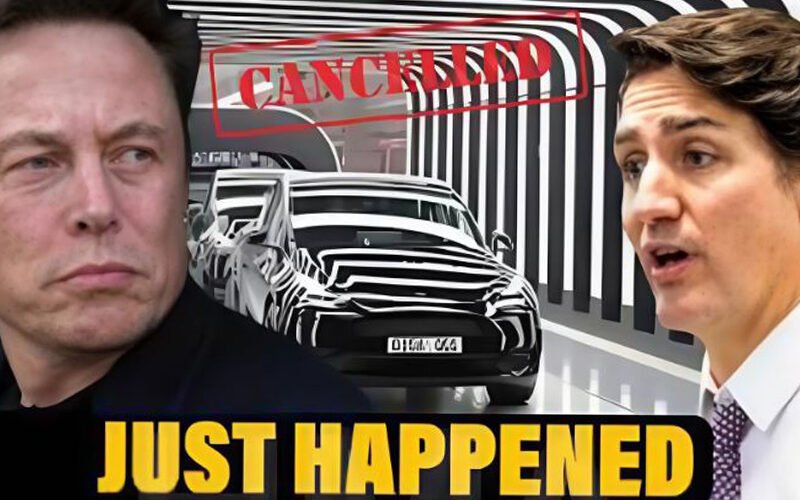Canadian Tariffs and Their Profound Impact on Tesla: Can the Empire Keep Its Batteries Humming?
In a rapidly evolving geopolitical landscape, the trade dynamics between Canada and the United States have become a major focal point for industries across both nations. For Tesla, the world’s leading electric vehicle (EV) manufacturer, these tensions present a direct challenge to its growth and profitability. At the heart of this conflict are Canadian tariffs—levied by the U.S. in response to increasing trade friction—that threaten to disrupt supply chains, raise costs, and inject uncertainty into Tesla’s operations. The question now looms: will Tesla be able to keep its batteries humming, or will the lights flicker out under the weight of trade barriers?
A Backdrop of Geopolitical Tension: The Tariff War

Trade Tensions Ignite: Canada Caught in the Crossfire
The story kicks off on March 11, 2025, when President Donald Trump’s administration abruptly escalated trade tensions by doubling tariffs on Canadian steel and aluminum—from 25% to 50%, effective immediately. The bold move struck at the heart of Canada’s economy, targeting one of the U.S.’s top metal suppliers and adding fuel to a fire already burning between the two nations.
While the U.S. and Canada have long maintained a cooperative partnership, their relationship has seen flashpoints before. Back in 2018, Canada retaliated against earlier U.S. tariffs with its own duties on American goods—ranging from whiskey and washing machines to U.S.-made vehicles. But this latest hike isn’t just about raw materials—it’s a strategic salvo in a growing trade war, as both sides aim to exploit each other’s economic pressure points.
Tesla in the Crosshairs
Amid this turbulence stands Tesla, the electric vehicle powerhouse that’s made serious inroads into the Canadian market. With a growing demand for clean transportation and a landscape tailor-made for road-tripping EVs—from the Rockies to the rolling prairies—Canada seemed like a natural fit for Tesla’s green ambitions.
Among Tesla’s lineup, the Model 3 has emerged as a fan favorite north of the border. Canadians appreciate its sleek design, long range, and the prestige that comes with the Tesla name. But with retaliatory tariffs looming, Tesla’s growth in Canada could be about to hit a wall.
The Tariff Effect: Tesla’s Price Tag Jumps
Tariffs act as a hidden tax on imports, and for Tesla—whose vehicles are primarily built in the U.S.—the blow is swift and sharp. Overnight, the Model 3’s price could jump by thousands of dollars, making it far less accessible to the average Canadian buyer.
Picture this: after weeks of research and excitement, a consumer decides on the Model 3, only to find the price has soared beyond reach. That sticker shock could send them searching for alternatives—perhaps Ford’s Mustang Mach-E or Rivian’s rugged R1T, both of which may avoid the brunt of the tariffs and suddenly look like smarter buys.
A Ripple Through the Supply Chain: The Hidden Cost

While the hit to consumers is immediately visible, the real damage runs deeper—into the heart of Tesla’s supply chain. Producing a high-tech electric vehicle like a Tesla depends on a tightly coordinated global network. And Canada is a key player in that network, supplying essential raw materials like aluminum and nickel—crucial for Tesla’s lightweight frames and the high-performance lithium-ion batteries that power their vehicles.
But tariffs threaten to unravel this delicate balance. Picture a shipment of Canadian aluminum headed to Tesla’s Gigafactory in Nevada. Once those new tariffs kick in, the cost of that shipment skyrockets. That added cost doesn’t vanish—it ripples through the production chain, ultimately making the end product more expensive by the time it lands in showrooms.
These kinds of disruptions don’t just inflate prices—they complicate production planning, potentially slow down manufacturing, and hurt Tesla’s operational efficiency. And if higher vehicle prices start to stifle Canadian demand, Tesla could be forced to scale back production, triggering job cuts not only at Tesla but also across the web of suppliers and logistics firms that keep the wheels turning.
In this escalating trade war, there are no clear winners—just industries, workers, and economies absorbing the fallout.
Investor Jitters: Market Confidence on Edge
Tariffs don’t just shake the factory floor—they ripple all the way to Wall Street. Tesla’s stock, already infamous for its sharp ups and downs, is especially vulnerable to trade-related headlines. Investors crave stability, and anything that threatens growth—like shrinking market share in Canada—can cause a swift, sharp sell-off.
When uncertainty rises, investor sentiment sours. Even the mere anticipation of reduced profits can send Tesla’s share price tumbling. And while markets can sometimes overreact, they also reflect deeper anxieties about a company’s future. Frequent volatility may discourage long-term investors, who tend to favor steadier, less exposed companies.
In the high-stakes world of international trade, Tesla isn’t just fighting to protect its margins—it’s also battling to maintain investor confidence in a turbulent geopolitical climate.
Politics and Strategy: Tesla’s Countermove?
While Tesla faces challenges, it is far from powerless in this scenario. As a major multinational corporation, Tesla commands significant resources, including a skilled legal team, lobbyists, and direct access to influential decision-makers. Tesla’s strategy might involve lobbying for an exemption from the tariffs, arguing that as a leader in clean energy and an employer of thousands, the company should not be penalized by trade measures that undermine its ability to deliver sustainable transportation options.
Tesla could even take the position that tariffs on electric vehicles are counterproductive to environmental goals, as higher prices could deter consumers from choosing EVs over traditional gas-powered cars. This narrative could gain traction in a world increasingly focused on reducing carbon emissions and fighting climate change.
The Road Ahead: Will Tesla Overcome the Tariff Hurdles?
As the trade war between the U.S. and Canada continues to unfold, the impact on Tesla is clear. The company is at a crossroads, where its ability to maintain its foothold in the Canadian market—and continue its global dominance—could be significantly impacted by these tariffs. With consumer demand potentially cooling, production costs rising, and stock market volatility, Tesla’s path forward will require careful navigation.
For now, the question remains: can Tesla keep its batteries humming, or will the lights flicker out under the weight of these external pressures? Only time will tell, but one thing is certain: the road ahead is full of suspense, and Tesla’s ability to adapt to these challenges will determine whether its empire can continue to thrive.







